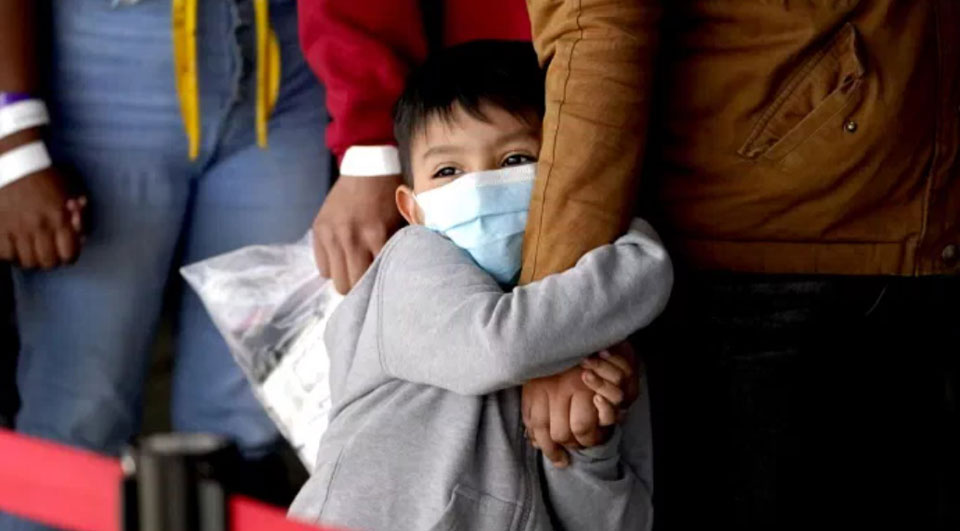
“Rolling back the policies of separating children from their mothers, I make no apology for that,” declared President Joe Biden at his March 25 press conference. “Rolling back the policies of “Remain in Mexico,” sitting on the edge of the Rio Grande in a muddy circumstance with not enough to eat — I make no apologies for that.”
“I make no apologies for ending programs that did not exist before Trump became President, that have an incredibly negative impact on the law, international law, as well as on human dignity. And so, I make no apologies for that,” President Biden declared.
He was responding to a barrage of questions from reporters who, instead of focusing on the Covid-19 pandemic and the most significant attack on voting rights since Reconstruction, chose to promote GOP talking points about the refugee “crisis” at the U.S.-Mexico border. They appeared suffering from amnesia about the immense damage of Trump’s cruel immigration policies.
Republicans are hoping xenophobic hysteria around immigration and “open borders,” will galvanize their base, catapulting them to victory in the 2022 elections. The Customs and Border Patrol, infested with fascist networks and Trump supporters, is collaborating with GOP elected officials, including a March 11 staged migrant crossing for the media. “This (was) a planned, coordinated attempt to sabotage the Biden administration,” said Jenn Budd, a former Border Patrol agent-turned-immigrant rights activist who works with the Southern Border Communities Coalition.
Additionally, eighteen GOP senators, led by Sen. Ted Cruz (R-Tex.), held a nighttime stunt on March 25 for TV cameras “hunting” immigrants crossing the Rio Grande, complete with military fatigues and firearms.
The GOP is also trying to divert attention from Biden’s early success with the Covid-19 mass vaccination program and the American Recovery Act passage with its transformational economic and social benefits.
According to experts, the increase in immigrants trying to enter at the U.S.-Mexico border was predictable and not attributable to Biden policies. The 28% increase between January-February approaches the 31% increase in 2019 during Trump’s presidency and is similar to what happens this time of year going back to 2012.
Instead, it reflects an annual spike of people making the journey north from the Central American Triangle countries of Guatemala, Honduras, and El Salvador. Migrants are fleeing desperate conditions, which Biden vividly described in his press conference, including violence, deep poverty, and natural disasters. They are trying to reach the U.S. border before the summer months’ unbearable heat in the Mexican desert. Many delayed making the perilous journey for an entire year because of the pandemic, making the numbers coming now even greater.
The increase is also a result of Trump’s failed “Remain in Mexico” policy and invocation of Title 42 of the 1944 Public Health Act, which blocks most refugees from entry based on the Covid pandemic. These policies, the brainchild of Stephen Miller, essentially erected an “invisible wall” meant to end immigration and asylum. They have stranded 70,000 asylum seekers in squalid and dangerous camps at the border. Trump’s “metering” policy, which severely limited asylum hearings, was a violation of U.S. and international asylum law. And many were expelled by ICE only to try to enter again.
In scrapping the Trump policies, the Biden administration and Democrats are racing to implement a 21st-century immigration system that recognizes new economic, environmental, and labor force realities. The new policies reject cruelty, brute force, detention, and border militarization, policies that have failed to address migration’s root cause.
The new policy, embodied in executive orders and the U.S. Citizenship Act, the most sweeping change in immigration law in a generation, includes a pathway to citizenship for 11 million undocumented immigrants beginning with those protected under DACA, the reunification of families, new ways for immigrants to enter the country, ending the Muslim ban legally, expanding the number of refugees permitted, and extending health care and worker and civil rights protections.
The Democrat-led House will take up the U.S. Citizenship Act in April. However, it has already passed The Dream and Promise Act granting a path to citizenship for 2.5 million ‘Dreamers” and the Farm Workforce Modernization Act, which would give legal status to 325,000 immigrant agricultural workers. All these bills face an uphill fight in the U.S. Senate and will not pass unless Democrats eliminate the filibuster.
But efforts to unwind the embedded Trump policies and transition to new ones will take time. Any change will be rocky given the GOP’s immense resistance, including its hold on state governments and pressure from the private prison complex. Besides, right-wing-dominated federal courts imposed a stay on Biden’s 100-day moratorium on deportations.
Biden is battling the “deep state” resistance of Customs and Border Patrol and ICE unions, which heavily supported Trump and continue to carry out his policies. Over 500,000 immigrants have been expelled by ICE under Title 42 since March 20, 2020, including over 1,200 Haitians since February 1, 2021.
Trump’s policies, geared around cruelty as deterrence, resulted in a humanitarian crisis, including family separation, caged children, indefinite detention in private facilities, and denial of asylum claims, including unaccompanied minors, a violation of the U.S. and international law. Not to mention sending asylum seekers back to dangerous conditions from which they fled.
The Biden administration has to address the increase in unaccompanied minors seeking asylum with an immigration system that was sabotaged and dismantled by Trump, including one ill-equipped to house large numbers of anticipated immigrants. A huge challenge is finding emergency housing and providing legal representation for these youth. The Trafficking Victims Protection and Reauthorization Act of 2008 govern the treatment of unaccompanied minors.
The administration is anticipating a record number of unaccompanied minors will seek asylum this year. In addition to reopening federal housing facilities, using hotels and the empty Dallas convention center, and enlisting FEMA, Biden announced additional housing at Fort Bliss near El Paso, Texas.
The administration has tasked Vice President Kamala Harris with crafting an overall strategy addressing migration at the border. “A large part of her portfolio will be to develop strategies regarding root causes that generate migrants and refugees,” said Frank Sharry, executive director of America’s Voice, “and to create legal pathways from the region that take pressure off the border.”
Simultaneously, the administration seeks to restore the U.S. asylum system dismantled by Trump and openly sabotaged by CBP agents and their union.
For the moment, the Biden administration has left in place Trump’s order using Title 42. However, Axios reported the government expelled only 13% of immigrants on March 14-21 because Mexico can’t process them. Although their stay in the U.S. is not guaranteed, the rest will be allowed into the U.S. to go through immigration proceedings.
The administration chooses to enforce Title 42 differently, no longer expelling unaccompanied minors, which is the cause of a significant increase in their numbers. “We have made a decision that we can address the public health imperative while addressing the humanitarian needs of vulnerable children,” DHS Secretary Alejandro Mayorkas said.
Still, immigrant rights organizations are sharply critical of the administration for not moving more quickly to stop expelling immigrants under Title 42, including blocking most refugees from applying for asylum. Advocates have criticized the administration’s handling of immigrants’ living conditions, especially for unaccompanied children. They are demanding an end to immigrants’ criminalization by closing ten immigrant detention facilities.
HHS is expediting the process of releasing unaccompanied minors to family members already in the U.S. through the Office of Refugee Resettlement. DHS estimates 80% of the children have relatives in the U.S. The CBP, which first detains the children, has been accused of slow-walking their release to HHS to sharpen the crisis. “It doesn’t take that long to process children,” said Budd.
So, the administration is appealing for federal workers to volunteer to help HHS contact families more quickly. Under Trump, family members were afraid to claim unaccompanied minors, fearing deportation.
“We’re not leaving this year without action on immigration beyond undoing Trump’s harms in our community,” said Erika Andiola, chief advocacy officer of RAICES. “We’re not going to take more criminalization to the immigrant community.”












Comments